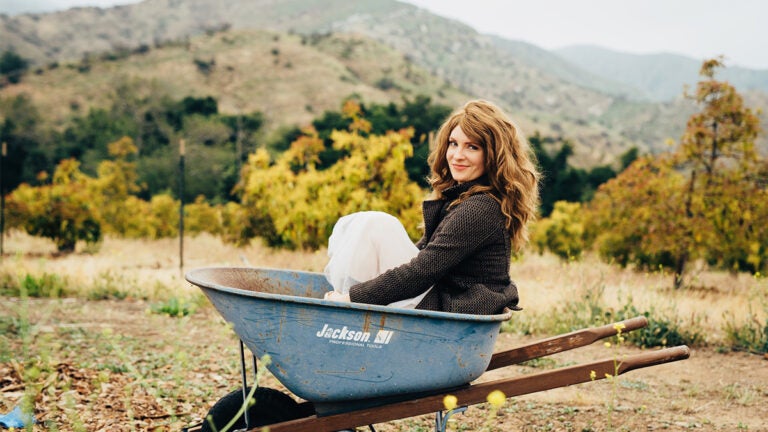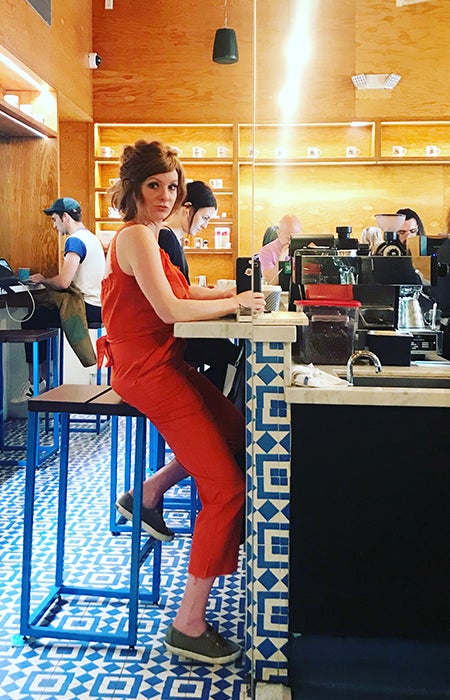
Once desperately shy USC Dornsife alumna is now the university’s director of belonging
It’s unlikely that anyone meeting Cat Moore before her mid-20s would ever have imagined her holding the position she now has at USC: director of belonging. In fact, they would probably have laughed at the very idea.
Moore says that throughout her childhood and early adulthood, she was painfully shy and found it hard to make friends and fit in.
“I went to all kinds of different schools and just really struggled to find my place, says Moore, who was born in a small steel town outside Pittsburgh in western Pennsylvania. “I spent a lot of my time up trees in the woods connecting with chipmunks because I just could not figure people out.”
She was still struggling to find friendship when she enrolled at USC Dornsife College of Letters, Arts and Sciences to study creative writing. After taking a philosophy class her first semester with Professor of Philosophy Dallas Willard, she decided to become a philosophy major.
“He was such a steady, warm, wise presence,” she said. “I was able to connect with him, and he was able to connect me to my deeper values and purpose and help guide me.
“I was desperately trying to understand these things … personally. My life wasn’t working.”
However, Moore says she knew there were answers because she saw others succeeding at living connected, joyful lives. Her education at USC Dornsife became a personal quest to find the answers she felt she was missing.
“I was determined to crack the code of belonging,” Moore says. “I realized it’s relationships, or what I call ‘the relational matrix of life,’ that is the foundation through which all other things happen. ,” Moore says. “Relationships are the bedrock and the infrastructure of life.”

However, while she found the intellectual answers at USC Dornsife, she still experienced crippling shyness and says she didn’t solve the experiential problem until she began hanging out every day at her local café as a mother-to-be.
“As my belly grew, people started breaking the ice with me.”
This made Moore feel so anxious she would sometimes take refuge in the restroom. But after a couple of months, she found she was able to respond.
“I realized, ‘This is something I can do. I can look at people. I can say hello. I can let them sit down for a couple minutes.’
“It was just that little window that I needed to realize that I could interact with people,” Moore says. “I felt like I had been living in a snow globe my whole life. And it really only took one crack in it to shatter the whole thing.”
Once Moore’s son, Noah, was born, she brought him with her every day to the café, prompting more customers to interact with the young mother.
Soon, people were lining up to talk to Moore for a few minutes — what she calls “the latte window” — while they waited for their coffee to brew.
“People would sit down not knowing me at all, spill their life story or tell me whatever it was that was weighing on them, burst into tears, not even know why, and get up and say, ‘Oh my gosh. Thank you so much for listening to me.’”
Moore says this happened over and over again with people from every possible walk of life: homeless people, CFOs, rock stars, veterans, single moms.
When Moore told Willard of this extraordinary transformation in her life, he responded, “Being with each other, as we are, where we are, is everything. But we organize our lives to death to avoid it because it requires that we slow down and risk being known.”
Moore says that when she received Willard’s blessing that what she was doing was indeed meaningful, she felt she had discovered her life purpose.
“I realized the dire human need to be heard and cared about in these extraordinarily simple, organic ways. In creating my own sense of belonging, I recognized everyone’s common need for this. And in providing it for others I was, in turn, providing it for myself and my son.”
At a time when 75 percent of the population is experiencing loneliness (up from 54% from pre-COVID), Moore’s work has never seemed more relevant. Hired by USC in 2018, Moore says the creation of her post in USC’s Office of Religious and Spiritual Life represents a breakthrough for universities in their approach to student well-being and credits USC’s Dean of Religious Life Varun Soni for his pioneering vision and tireless work to make this position possible.
At USC, Moore has created workshops to teach her method to connect with others and defeat loneliness, a process she calls CLICK: Connect, Listen, Investigate, Communicate Kindness, & Keep in Touch.
Here, Moore answers questions about her role, offers her top five tips to encourage good mental health during this particularly challenging time and reveals what she hopes we will all take away from this period.
Why do you think it is important for USC to have created a position such as yours and what is your goal?
As far as we know, there is no other position of this kind at any other institution of higher education. What USC is saying with this non-therapeutic, non-intervention approach is that a sense of belonging and the experience of relational well-being is a basic, healthy human need and we’re going to create the conditions for those needs to be met.
Why is this period proving so challenging to so many people?
Our usual social structures have dissolved or been severely narrowed, and this change has forced us to become acutely aware of our own experience, needs and resources. We’re having to pioneer a path through a new social landscape without a map, without the familiar tools, processes and teams. It’s a big, exhausting ask, but ultimately, we are building new muscles, discovering new things about ourselves and each other, and learning how to accept the challenge on the tiny, moment-by-moment scale.
What are your top five tips for maintaining good mental health during this difficult time?
All the elemental things are asking for our attention right now: good sleep, exercise/movement, nutrition, time in nature.
Find a contemplative practice, such as journaling or meditation, to process your experience.
Savor simple joys, allow yourself to be curious and in awe of life around us, and cultivate daily gratitude for the good we are still holding.
Find simple ways to serve and create belonging for those around you. Whether on screen or safely off screen, reach out to friends, family, neighbors, essential workers to see how they’re really doing, ask what they need and reassure them that they are not alone — we’re getting through this together.
Remind yourself that this is one season, not your whole life. If we can embrace the limits of this unique time, we’ll be free to experience the new possibilities of it and maybe discover the seeds of a new, hopeful vision for our shared lives.
What do you hope we can all learn from this difficult period?
I’m hoping that we can gain clarity on what really matters to us and why. When the storm shakes the tree, many leaves fall off, but the roots dig down deeper. I’m hoping we can all re-root in our cherished values and vision for our personal and shared lives and discover new ways forward together, starting with acknowledging that we all belong here, exactly as we are, and are irreplaceable.
Whatever else is true of tomorrow, we can be sure that we’ll still have the power to create belonging for those around us by being present, listening and caring.